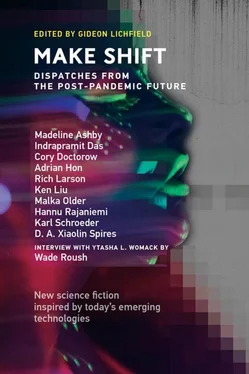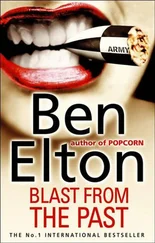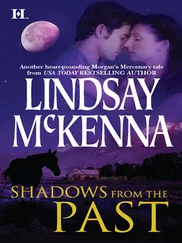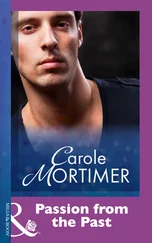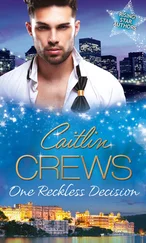Torsti had taken an eager step forward and looked into the churn. The vast depths had looked back, like the entire island was a monstrous eye and the churn its pupil, inhuman and black and fathomless, like Death itself. The stone had fallen from his hand and he had run away in tears. Even now, seven years later, he remembered the shame of it.
And I remember you , the churn seemed to say. I haven’t changed. I am the past. I am the future. I’ll get you in the end.
“No, you won’t,” Torsti muttered under his breath.
Branches rustled, and his heart jumped. A tall figure loomed on the other side of the churn. It wore dark overalls, gloves, and some kind of helmet. In the shadows, its face looked skull-like.
Then it stumbled on a pebble and set off a small avalanche into the depths of the churn. It let out a muffled curse in a familiar voice.
“ Perkele ,” Grandfather swore. He was wearing a battered face shield over a cloth mask, but his bushy eyebrows were unmistakable.
This is it, Torsti thought. He tried to will his legs to move, but the terror of the churn still held him in its grip.
Grandfather raised a hand. “Don’t try to come any closer, boy,” he said. “I mean it.”
Torsti stared at him helplessly. The old man huffed and adjusted his mask. This wasn’t going to work, he realized. The vaccine replicating in Torsti’s upper airways was engineered to be infectious, but just like the old Pandemic One virus it was based on, it still needed close contact to spread, especially outdoors.
Very slowly, Torsti took half a step forward.
“Stop right there,” Grandfather said, “or I’m going to run.” His voice was thin. It was hard to see his expression behind the mask and the plastic face shield, but his eyes were wide. He is afraid, Torsti thought. He has never been afraid of anything.
“I’m going to rest here for just a moment,” Grandfather said. “You stay right there.” He sat down on a boulder and massaged his leg, not taking his eyes off Torsti. “Did your mother send you?”
“No!” Torsti said. “Why are you dressed like that?”
“Well, I think it should be obvious. I don’t want to catch your damn vaccine, that’s why.”
“Why not?” That was the question that had been haunting Torsti for two years, ever since his mother had told him that they wouldn’t be visiting Grandfather during vaccine season anymore. He was surprised by how fierce his voice sounded. “Why did you stop talking to us? What did we do to you?”
Grandfather ignored him and took a phone from his pocket. He tapped at the screen laboriously—typically, he hadn’t had the opto interface infection either, and had to use all his devices by hand.
“Doesn’t look like you are shedding that much,” he muttered. “Thank goodness for kids’ immune systems.” Then he looked up, narrowing his eyes. “If your mother didn’t send you,” he said suspiciously, “then how did you get here?”
This wasn’t the Grandfather Torsti remembered from the vaccine seasons past, the one who had played hide and seek with him and built a castle from sticks and pine cones in the secret grove on the eastern tip of the island. This was someone else.
“I skipped school,” he said, swallowing back tears. “Then I took a train to Hanko. There was a fisherwoman Rnought introduced me to. She lent me her boat.”
“Why on earth would somebody do that? Who the hell is this Rnought?”
“It came out last year. It’s a serendipity AI to speed up vaccine spread. If you already caught the vaccine, it matches you up with people who want to be immunized and can help you with something, or the other way around.”
One of the benefits of living in Helsinki was catching every new vaccine days or even weeks earlier than the rest of the country, and Torsti had gone to the big launch party at the Senate Square with his parents. And the new vaccine was so popular that the fisherwoman had jumped at the chance of helping Torsti get to Jungfruholmen, in exchange for a verified transmission.
“Sending a twelve-year-old out to the sea on his own, just like that.” Grandfather said, shaking his head. “Everyone has gone mad. When I was your age, we couldn’t always trust the machines to save you. That’s what’s wrong with this world, it’s too safe.”
“No, it’s not,” Torsti said. “It’s not safe. People still get old. People can still die.”
“Unless they get this bloody vaccine, is that it? A vaccine against death?”
It wasn’t a fix for death, not really. Torsti knew as much. But it was the next best thing. It was the last in the long series of vaccines the Global Immunity Foundation had been releasing for decades. Backed by a group of billionaires, they had invented transmissible vaccines to stop Pandemic One—a controversial move at the time, but necessary when more than half of Americans and countless others around the world had refused to be vaccinated against COVID-19. After an initial uproar, the Foundation had been hailed as heroes after they stopped Pandemic Two in its tracks, saving countless lives. In the two decades since, the Foundation’s vaccine releases had been coming out on a regular basis: first, updates against emerging coronaviruses, flu, dengue, pre-pandemic zoonotics. And eventually, protection from the big ones, non-transmissible diseases—heart disease, Alzheimer’s, and cancer.
Now each vaccine release was a global event, a cause for celebration. At Senate Square, this one had rained down on a cheering, dancing crowd from dispersal drones amidst a bioluminescent fireworks display. Pre-infected choirs had sung it onto onlookers from the steps of the Helsinki Cathedral. The new vaccine was a senolytic: it trained your immune system to kill the zombie cells that accumulated in your body with aging. You wouldn’t live forever, but you would stay healthy much longer—no one knew how long. There were still mice alive from the first experiments, decades ago.
Torsti had clinked glasses with Mom and Dad when their phone sequencers confirmed their infections—champagne for his parents, Pommac for him—and then hugged and kissed passersby, all in vaccine season masks—feathers, crowns, and horns, but always leaving the mouth and nose uncovered. And then, all of a sudden it was as if he was watching the revelers from behind a pane of glass, cold and distant. How could they celebrate when there were those who would be left behind?
Like Grandfather.
“Is that what this is about, Torsti? You don’t want me to die?” Grandfather asked.
Torsti stared at him. Grandfather really didn’t understand. But maybe it was unfair to expect him to. Unlike Torsti, he hadn’t grown up with Mom coming home and talking about her job at the Long Reflection Committee. Over and over, she had explained what a special time this was in the human history. Things no longer hung in balance, existential threats—pandemics, bioterror, rogue AIs—had been overcome. It was time to look toward the deep future and decide humanity’s destiny.
Torsti had loved it, and had devoured everything the Committee published that Mom let him read. He had even started contributing ideas to the Committee’s open simulations that mapped out possible futures, millions of years ahead. He had spent countless hours wandering through the virtual worlds, until his parents disabled his opto. And even then, his imagination kept going, conjuring images of things to come.
GRANDFATHER DIDN’T REALIZE THAT THE VACCINE WAS JUST THE FIRST STEP. THECommittee scenarios were clear. If you extended your life by just a decade or two, the next set of longevity technologies would come along—not just to prevent aging but to restore youth—and so on. Longevity escape velocity, it was called. If you made it just a little bit further, you could travel to the stars, live as long as the universe itself.
Читать дальше
